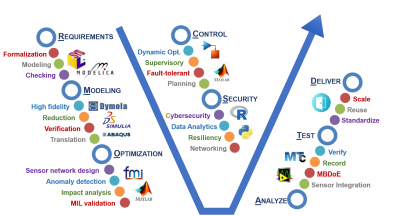Project Summary

A prior analysis of the requirements of the manufacturing facility of interest, the process constraints and the potential for energy savings is critical to the success of the project. Requirements will be defined by analyzing the energy consumption breakdown of major components of typical manufacturing equipment used in production and identifying the most energy-hungry devices and potentials for energy savings during both the manufacturing process and idle. Therefore, the system requirements must first be documented as measurable, traceable and implantable to the facility model as constraints or targets. In this task, system requirements and constraints, as well as opportunities for energy waste mitigation, will be defined to a level of detail sufficient for system design and optimization. This task will focus on the following:
• Define, assess and document the requirements, constraints and energy targets and savings potential. (subtask 1.1)
• Sensitivity and uncertainty analysis of the test bed facility to identify the most critical system inputs and parameters for energy waste minimization. (subtask 1.2)
Project Sponsor
Clean Energy Smart Manufacturing Innovation Institute
Investigators

George Bollas
Dr. George Bollas is the Director of the Institute for Advanced Systems Engineering (IASE) at the University of Connecticut. He is an Associate Professor with the Department of Chemical and Biomolecular Engineering at the University of Connecticut, a process design expert and winner of the prestigious NSF CAREER Award and the ACS PRF DNI Award. He received B.E. and Ph.D. degrees from the Aristotle University of Thessaloniki in Greece and then worked as a postdoctoral research associate at the Chemical Engineering Department of MIT. At UConn, he is leading efforts to develop and explore novel system representations (steady state and dynamic models) of thermal fluid systems (TFS) in equation-oriented environments that allow system dynamic optimization, sensitivity and uncertainty analysis, fault detection and optimal control. Dr. Bollas is also the director of the Process Design Simulation and Optimization Laboratory (PDSOL). The lab pursues a balanced approach to experimentation guided by robust modeling and simulation of chemical processes, including experimental design, process scaling and control.

Krishna Pattipati
Dr. Krishna Pattipati received the B. Tech. degree in electrical engineering with highest honors from the Indian Institute of Technology, Kharagpur, in 1975, and the M.S. and Ph.D. degrees in systems engineering from UConn, Storrs, in 1977 and 1980, respectively. He was with ALPHATECH, Inc., Burlington, MA from 1980 to 1986. He has been with the department of Electrical and Computer Engineering at UConn, where he is currently the Board of Trustees Distinguished Professor and the Chair Professor in Systems Engineering. Dr. Pattipati’s research activities are in the areas of proactive decision support, uncertainty quantification, smart manufacturing, autonomy, knowledge representation, and optimization-based learning and inference. A common theme among these applications is that they are characterized by a great deal of uncertainty, complexity, and computational intractability. He is a cofounder of Qualtech Systems, Inc., a firm specializing in advanced integrated diagnostics software tools (TEAMS, TEAMS-RT, TEAMS-RDS, TEAMATE), and serves on the board of Aptima, Inc.
Dr. Pattipati was selected by the IEEE Systems, Man, and Cybernetics (SMC) Society as the Outstanding Young Engineer of 1984, and received the Centennial Key to the Future award. He has served as the Editor-in-Chief of the IEEE TRANSACTIONS ON SYSTEMS, MAN, AND CYBERNETICS–PART B from 1998 to 2001. He was co-recipient of the Andrew P. Sage Award for the Best SMC Transactions Paper for 1999, the Barry Carlton Award for the Best AES Transactions Paper for 2000, the 2002 and 2008 NASA Space Act Awards for “A Comprehensive Toolset for Model-based Health Monitoring and Diagnosis,” and “Real-time Update of Fault-Test Dependencies of Dynamic Systems: A Comprehensive Toolset for Model-Based Health Monitoring and Diagnostics”, and the 2003 AAUP Research Excellence Award at UCONN. He is an elected Fellow of IEEE and of the Connecticut Academy of Science and Engineering.